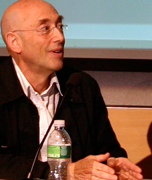 |
 |
 |
 |
the future of publishing
summary
Gavin Grant, Small Beer Press
Jennifer Jackson, Donald Maass Literary Agency
Robert Miller, HarperStudio
Bob Stein, The Institute for the Future of the Book
Moderator: Geoffrey Long, MIT CMS
audio (realfile) | podcast | video
Summary by Andrew Whitacre, edited by David Thorburn
Photos by Greg Peverill-Conti
[this is an edited summary, not a verbatim transcript]
Moderator Geoffrey Long opened the conversation with questions for Gavin Grant: How has the rise of new publishing and promotion technologies affected how you acquire, produce, and publicize your titles? Has it made business easier? How has it made it harder?
 |
Gavin Grant: The future of publishing is mixed. I don't think social media has changed how we acquire books. Most of our books are acquired from trusted recommenders. Production hasn't changed either--we came into publishing late, in 2001, when the barriers to entry had already dropped. Publicizing--this part is interesting. I'm not one who twitters or, until a month ago, uses Facebook. But I like what's going on. I don't quite know what it is, but the most passionate readers are finding our site there.
We have a blog. We have lots of social media type of things, and to a certain extent those things have worked. But the breaking point is the obsession people have with the hyperlocal, finding local people and selling things to them, even if that locality is in a different physical space. If the next version of Skype has a video conference feature, for this kind of event we'd probably have 2,000 people participating. Making a product here and finding a reader there--distribution--has always been the challenge.
Hopefully the future of publishing will come down to narrowcasting. If you like book A and book B, you'll really like book J.
I think Amazon is the evil heart of publishing. If you buy from Amazon, you’re killing local bookstores. The Amazon model is so messed up--you buy book A, you buy book B, and then you're recommended the best-seller. I hope the future of publishing will take your information stream and get you books A, B, and then J.
 |
Jennifer Jackson: I'm interested in what my authors are doing with direct marketing. Some are making book trailers on YouTube. Their quality varies, but they allow authors to bring information directly to their readers. It's exciting to me to see people be active and connect.
Robert Miller: I was frustrated with the industry. Advance levels had gotten out of control. Returns were up to 40%. Marketing costs to bookstores were astronomical. So I wanted to start something from scratch, be the guinea pig for a trade imprint.
I'm interested in bundling physical and digital formats, but that turned out to be tougher than I thought. You can't bundle them on Amazon. So we did it ourselves on our website. If you buy the physical book for $19.95, you get the ebook for free. If you buy the hardcover, the ebook, and the audio book, we charge $24.95, free shipping, and 20% off. A consumer shouldn't have to purchase the same book each time in different formats. If you buy the physical book, you should get credit towards the other formats. Once I'm paid for the book, I'm happy to sell the other formats for a little less.
Geoffrey Long: Jennifer, you maintain two vibrant weblogs. One showcases new releases from your clients, and the other on LiveJournal highlights your work as an agent. Like other agents, you publish statistics on how many submissions you receive and reject. And on Twitter, both authors and agents have begun to reveal their inside stories--rejections, bad queries. Is all this transparency a good thing?
Jennifer Jackson: It's good and bad. I was an agent before blogs, and even websites. In the pre-digital days, it was harder to find an agent, and publishers received far fewer queries. And many of the queries agents did receive showed no awareness of the agent’s preferences and specialties. It was an isolating process. There was a great divide between authors and agents. You met authors face to face only at conferences.
Fast forward to today, you have a meta-conversation, with lots of editor participation, allowing for a direct connection. I get to talk about the things that work and don't work, conduct polls, list topics I've asked for submissions for. Authors get an insight into how you leverage and triage your time. And the process also works in the other direction: you can read how authors felt when they receive your rejection.
But you have to have a certain level of caution about the public face you put out. Now readers can tell authors how they feel about a promised book that hasn't come out for three years.
Altogether, these new channels of connection are a good thing.
Geoffrey Long: Do most of you keep a blog or public presence?
 |
Robert Miller: Keeping our blog going is an interesting side-job. It's good. We have a thousand people reading each day. You have to have a thick skin, because some just say you're an idiot. But we've gotten great feedback. We'll offer $25 for book title suggestions. We've used the crowd to help make decisions.
Gavin Grant: We have a blog, but we don't go for full transparency. Many of us don’t want to be known; we want the focus on the book. We don't want people thinking, "Good lord, that was a well-edited book."
Geoffrey Long helped us set up a Flickr group which solicited cover artwork. We got lots of material that we'd happily use on covers.
Geoffrey Long: Ebooks seem to require us to buy our libraries all over again. What's your read on the state of the ebook? Is it the next great thing for publishing?
Robert Miller: There's a convenience for most readers in having books available. Ebooks create incredible access to books for many readers. And publishers save the cost of production and returns. Ebooks save environmental costs—transporting printed texts causes pollution in addition to being expensive. But so far the ebooks comprise only .5% of the total market. We can project out that that graph will get steeper. In Japan, a very high percentage of reading is done on phones.
The dark side, something to grapple with, is the downward pressure on pricing. Consumers are going to expect a lower price on an ebook. It's going to take revenue out of the business.
Gavin Grant: We produce half of our titles as ebooks. Some authors don't want to sell ebook rights; they might be waiting for Amazon to move in and buy those rights. But I'd rather have my fiction available lots of places, beyond the Kindle users.
I don't agree that all the production cost disappear with ebooks. Formatting is a problem. The most common download format for our books is as PDF. But creating all those other formats is a hassle.
 |
Bob Stein: Publishers seem to think all the problems that hit the music and film industry won't hit the publishing industry. Because of piracy, I think what will happen is there will be a necessity of redefining content to include the conversation content engenders. People will be willing to pay for community.
Jennifer Jackson: It's not a book anymore, it's a conversation?
Bob Stein: I'm redefining the content to include the conversation.
Robert Miller: This is where the bundling idea came to me, through the music industry.
Jennifer Jackson: Electronic books scare some of my authors because they think they're going to be stolen. But authors like Cory Doctorow have shown that Creative Commons-licensed books actually generate more interest over the life of the book.
Gavin Grant: The fall in music sales is disguised by the fact that people have finally stopped re-buying their music libraries. The music industry could depend on new formats coming along, but now that we have MP3s, that has stopped.
Bob Stein: If we ask what’s next for books, we need to realize that what’s emerging will be a complex, hybrid medium, one we haven't seen yet, that will include sound, text, etc. New books will be born digital.
[Stein then showed a slideshow covering the history of the book and some of the technology used by the Institute for the Future of the Book, including an online version of Doris Lessing’s The Golden Notebook that included a conversation among readers, an asynchronous reading group.]
The marginalia in some traditional books was a form of serious conversation among editors and commentators. We can recreate something similar online, having comments to the side of the text rather than below. Authors can become active discussants or moderate like a teacher in a seminar. A book is a place where readers (and sometimes authors) can congregate. The future of publishing will be about building communities around works.
Geoffrey Long: How are authors, agents, and publishers evolving in this new environment?
Jennifer Jackson: We're all still adjusting. Books aren't going to go away entirely. They're romantic, portable, they feel good. But there's a place for evolution. We're moving towards conversation between the author and readers.
Robert Miller: We're getting ready for a great contraction. As Warren Buffett says, it's only when the tide goes out that you see who's not wearing a bathing suit. But it's also a time for experimentation. It's going to be a continuing, daily evolution. We're giving away pieces all over the place, and it's causing books to sell.
Bob Stein: That's the problem. The idea of the book as a specific object is deeply embedded in the DNA of the publishing industry. But we're moving away from that. Fundamentally book publishers are in the business of selling physical books. I don't think they're the ones likely to give rise to the new forms that will be as important as books are now.
Gavin Grant: Seventeen million board books sold last year. Until an electronic reader is waterproof and chewable by babies, we're still going to have a lot of books.
Jennifer Jackson: We need to see physical books as part of a story.
Audience Q&A:
Question: Have you seen interest from your authors in making versions of their stories that are location-based?
Jennifer Jackson: There are things I'd like to see in that format.
Gavin Grant: If you check out some of our titles on Google Books, you’ll find that the site maps locations mentioned in our books.
Question: What about social networking around books? And updating books? Also, please comment on the fact that there's no way to lend your Kindle book to a friend, or to hold a used book sale.
Jennifer Jackson: I have a client who was happy about the Kindle because it meant readers couldn't share their books. And one publisher I deal with set up a site for a young adult series that allows readers to choose favored clothing and similar things; basically they’ve created a social site built around the series.

Bob Stein: The obsession with fixed versions is old-school, I think. Our lives don't have versions; they just flow for as many years as they can, and we take snapshots. These new kinds of books are going to flow and keep changing. We can lose some of our anxiety about the way books and reading are changing when we recognize that books needn’t be fixed or finished, but can be ongoing projects, texts that evolve or update.
Question: Fan communities have been physically distributed for a very long time. And there are organizations that actively encourage connection between authors, readers, and content. I wonder if the panel can speak to that kind of future, where there's some exchange with the consumer?
Bob Stein: I believe in fan fiction. Fans should be able to add chapters to books. We're looking at a future where the text doesn't stop when the author stops. Readers have a tremendous role to play. Why shouldn't people remix Huckleberry Finn so they can talk about it? These books are important cultural seeds.
Question: A lot of what is being talked about is reminiscent of the pain the newspaper business has gone through. They're trying new digital formats, too, but they're still going out of business. Why are books different?
Gavin Grant: Newspapers are ephemeral compared to books. Books aren't replaceable. Newspapers are fighting for attention from 100 best friends and family, when books don't have to do that. If readers decide to follow serial fiction, then we're screwed. But I don't see that happening. I don't think the object will disappear in the way newspapers will. The news isn't going away, the newspaper is going away.
David Thorburn: Newspapers have more readers than ever, but they can't make money from them. People all over the world now read The London Times. Books are more resilient. It's useful to be reminded of the principle of historical continuity. Central formats and institutions change slowly. For 250 years after the printing press a scribal culture still existed. There are certain pleasures that the book as a physical object is much better at satisfying than a digital product is. The panel seems to be too pessimistic. I'm suggesting that it's premature to sing the Gutenberg elegies. Just as radio survived the advent of television, so the book will not only retain certain functions but will discover new functions and exist in new niches.
Jennifer Jackson: I hope you're right, because I love my books. And I love my new Sony e-Reader.
 |
Bob Stein: I profoundly disagree. It's only been for about 50 years that the broad middle class could afford to assemble libraries. This idea that books are central to the human experience is really only a 50-year span.
I don't want to switch my reading in general to electronic devices, but sometime soon you will have to decide what is better for reading on than paper.
David Thorburn: But I think we're underestimating what an astonishing technology the book is. It's resilient, it doesn't need batteries, it can survive in any climate, it can be dropped from great heights without damage. It seems to me that we can surely acknowledge that certain forms of print culture will disappear but that the ease with which you can carry and page through a book has, at least for now, no digital equivalent.
Robert Miller: Publishing today has a disastrous business model. It may be that digital formats are a way to find out which books should be put on paper and kept in your library. There are many ways these things can co-exist.
top
